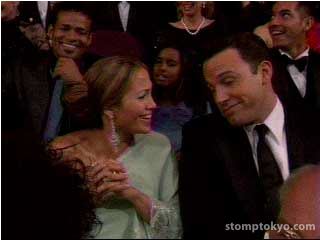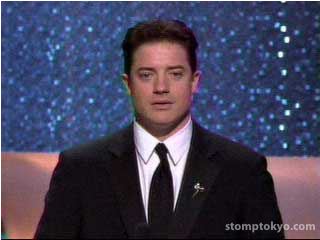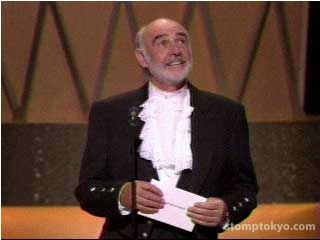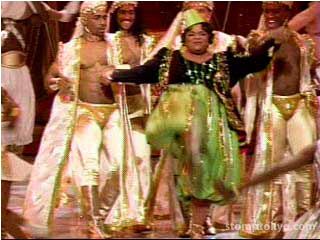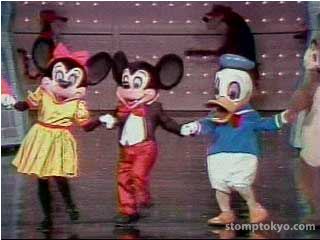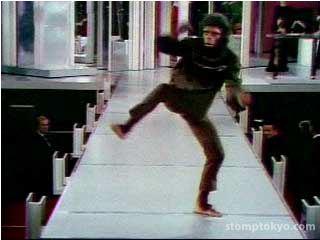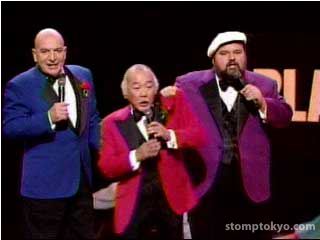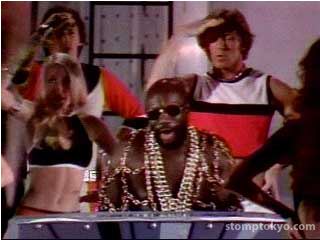If you’re the kind of person likely to be reading this column, you probably saw last night’s Oscar ceremonies. Therefore you probably also saw Michael Moore’s, uh, “acceptance speech” when
Bowling for Columbine won the award for Best Documentary Film. I won’t go into the details except to reprint the Associated Press account of what he said:
“We live in fictitious times. We live in the time where we have fictitious election results that elect a fictitious president. We live in a time where we have a man who's sending us to war for fictitious reasons, whether it's the fiction of duct tape or the fiction of orange alerts, We are against this war, Mr. Bush. Shame on you, Mr. Bush. Shame on you," Moore shouted, surrounded onstage by his fellow nominees in a show of solidarity.
Back in 1989, Michael Moore made a superb documentary film called
Roger & Me, which detailed the economic decline of his hometown of Flint, Michigan. Flint was the bedroom community for the factories of General Motors, and when GM closed most of the plants near the town to use cheaper labor in Mexico, Flint suffered miserably. Moore pursued then-GM Chairman Roger Smith in an ultimately futile attempt to ask Smith why he was closing the plants and robbing his fellow GM employees of their livelihoods. If you haven’t seen it, you should: it’s wry and touching, and reveals Moore as a brilliantly funny and compassionate person.
In the years since, I have followed Moore’s career with enthusiasm: first, he made a PBS-aired sequel to
Roger & Me called
Pets or Meat: The Return to Flint, followed by a bit of misstep with the fictional comedy
Canadian Bacon. Then, Moore seemed to find his calling with a television series called
TV Nation, and later another series called
The Awful Truth, and a second feature documentary,
The Big One. All of these focused on what Moore does best: exposing the hypocrisies of popular and corporate American culture. Sometimes the material felt a bit recycled, but it was always good for a laugh, and even Moore himself was occasionally surprised by some of the results. One particularly memorable episode of
TV Nation featured a Vice President of Ford Motors proving that he could do the job that he asked his employees to do by changing the oil in a Ford truck. An exec from IBM, by contrast, refused to meet Moore’s challenge to format a floppy disk.
Moore complemented his film and television work by writing books on similar subjects. These were full of much of the same humor, and did fairly well. (
Stupid White Men... and Other Sorry Excuses for the State of the Nation was, according to the
New York Times, the best-selling non-fiction book of 2002.) But I, like most Moore fans, was really waiting for the next film.
Bowling for Columbine is one heck of a movie. It’s an important film that asks a lot of crucial questions about the excessive gun violence in America and the causes for it. Moore makes unflinching use of some brutal footage to illustrate his point, most notoriously the security camera footage from the Columbine High School shootings in 1999. Everyone who watches it is provoked in some way. In a country with an extraordinary and seemingly inexplicable history of firearm violence that far outstrips every other country in the world, it is a movie that needed to be made.
The problem is, I’m not sure Michael Moore should have been the one to make it. Moore’s growing tendencies to inject himself into the story have changed his on-screen persona. No longer does he seem like an affable-yet-determined rebel filmmaker. Instead he comes off as a belligerent rabble-rouser with nothing better to do than harass celebrities who own fast-food chains. Granted, Moore did some actual good with his activities during the making of
Bowling — K-Mart actually stopped stocking firearm ammunition in their stores, apparently as a result of a Moore-organized protest. I wonder, however, how much damage Moore has done to his own causes by resorting to underhanded interview tactics and rank sentimentalism.
To illustrate, let’s recall one of the final scenes in
Bowling for Columbine. Moore sets up an interview with Charlton Heston, allegedly to speak with him about his career as president of the National Rifle Association. Arriving at Heston’s home, Moore pulls an NRA membership card from his pocket and shows it to the actor. The two proceed to have a conversation which quickly turns uncomfortable, at least for Heston. The filmmaker asks some very pointed questions about Heston’s theories about gun violence in America, and when it becomes clear that Moore’s opinions are anything but those of a typical card-carrying NRA member, Heston terminates the interview. Moore, who was asking for an apology from the NRA for holding rallies in Flint just days after a little girl was shot there, leaves a picture of the young victim behind. It’s an affecting bit of filmmaking, but clearly Heston was ambushed and Moore’s use of the girl’s face as an emotional tool is more than a little ghoulish.
I’m not sure why Moore’s comments on stage at the Oscars took me by surprise; his behavior over the last year has been more and more confrontational. (He even — allegedly — managed to alienate the workers at the London theater hosting his live show by verbally assaulting the entire staff during a dispute over his paycheck.) Clearly
the press was eagerly awaiting Moore’s on-stage attack on Oscar night. But the hour was late, and the evening had been relatively quiet, politically speaking, so Moore’s performance as he accepted his statuette caught me off-guard.
Happy as I am to admit Moore's right to use his forty-five seconds of screen time as he did, I must also admit to some disappointment with what he did with those seconds. What could have been an argument that was as well-reasoned as it was inflammatory was instead a rant that bordered on name-calling. Continued expression of bitterness over the 2000 election results is surely beating the deadest of horses, and I have to wonder if Moore's fellow nominees knew exactly what Moore was going to say. (By the way, Mike, invoking the names of the Dixie Chicks in support of your cause didn't exactly do you any favors.) Moore's Academy Awards blowout didn't change any minds and merely gave his detractors more ammunition to use against him -- and those who share his opinions.
Even more disappointing is the fact that Moore allowed himself to be distracted from the movie that won him one of the world's most coveted trophies. The war on Iraq weighs heaviest in most of our minds these days, but when those troubles are over, we will still be left with the fact that Americans are at war with each other every day, using weapons as deadly as those wielded by any U.S. Marine or member of the Iraqi Army. Pointing that out even during wartime, and thanking those people who helped make
Bowling for Columbine possible, could have proved that Michael Moore is a class act. Instead, the man who has appointed himself as the arch-nemesis of President George W. Bush will presumably rouse more rabble in his next film. The working title:
Fahrenheit 9/11: The Temperature at Which Freedom Burns.
(As a quick aside – I didn't intend for my first Blue Glow entry to be this political and serious, but that's the way the timing worked out. Frivolous entries on the way soon, I promise. -CH)

